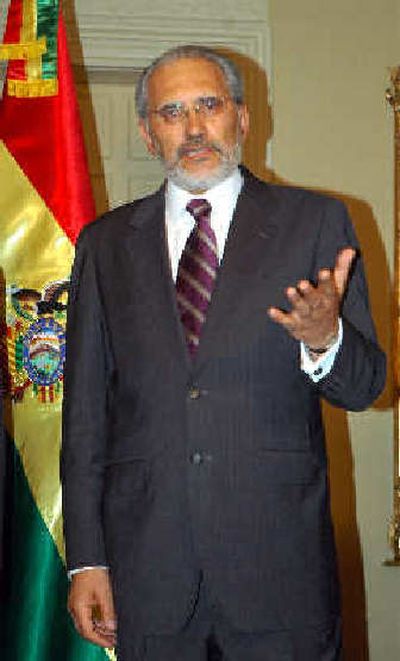Violence continues even with Mesa out

LA PAZ, Bolivia – Violent street protests choked off Bolivia’s crippled capital on Tuesday, as the collapse of President Carlos Mesa’s government failed to quell demands by the poor Indian majority for more power from the white elite that has ruled the country for decades.
Riot police firing tear gas canisters sent thousands of demonstrators fleeing down the streets of La Paz’s old colonial center.
Miners, who joined protesting Indians, farmers and laborers, responded by blasting dynamite. Ambulances sped away with victims and a major public hospital said it received 12 victims. Most were felled by tear gas and rubber bullets, but the hospital said one miner lost a hand in a dynamite explosion.
A group of officers dragged miners from the yellow dump trucks they had used to converge on the city, beating some of the protesters as others regrouped amid the biting tear gas.
Army troops took up defensive positions around the Government Palace, the scene of clashes Monday that capped weeks of opposition to Mesa’s U.S.-backed, free-market government. Police reported at least 42 arrests by late afternoon, when most of the demonstrators had dispersed.
Mesa announced his resignation late Monday. Congressional leaders said they would call an emergency session Thursday at which they were expected to accept his offer – provided conditions were secure enough to convene Congress.
Mesa went on national television late Tuesday to urge lawmakers to quickly call early national elections, saying it was the only solution to the crisis.
“Let’s put an end to this craziness,” said Mesa. “The only way to avoid further violence is to hold elections right away.”
Congress could call new elections if it accepts the resignation. Such a vote would raise the prospect of Bolivia becoming the seventh Latin American country to move to a leftist government that is suspicious of U.S. intentions in the region.
Protest leaders have said they will not relent in the daily protests that, coupled with street blockades, have caused food, gasoline and water shortages in the capital and shut down public transportation and most business activity.
Bolivia is the poorest country in South America and home to an Indian majority that has helped reignite a crisis that has sputtered on and off for decades over demands for greater power.
The crisis in this nation of 8.5 million people pits Indian and labor groups from the poorer western highlands, including La Paz and its poor satellite city of El Alto, against ruling elites from Santa Cruz in the east and the oil-rich gas fields to the south that are pursuing greater autonomy.
The protests have steadily escalated since Bolivia’s Congress last month raised taxes on foreign oil companies developing Bolivia’s natural gas reserves, which are the second-largest in South America after Venezuela.
The collapse of Mesa’s government highlights the growing instability of the Andean region. It follows by just weeks the ouster of Ecuadorian President Lucio Gutierrez in the midst of massive street protests.
In Peru, President Alejandro Toledo, survived an attempt in Congress last month to declare the presidency vacant after a congressional report accused Toledo of helping forge party registration rolls.